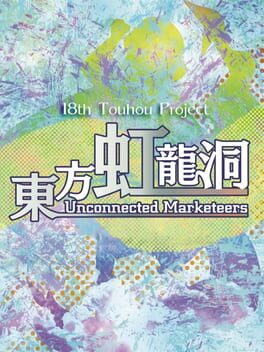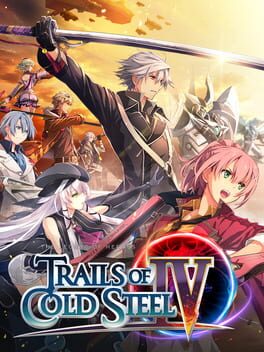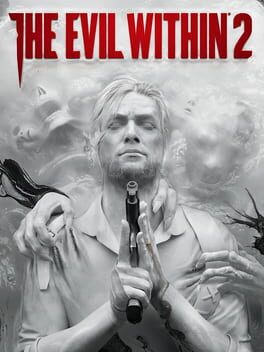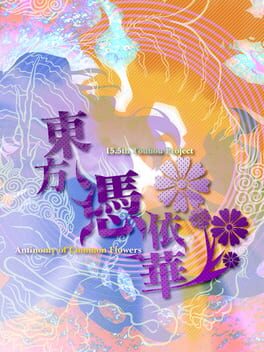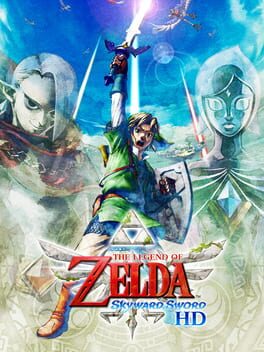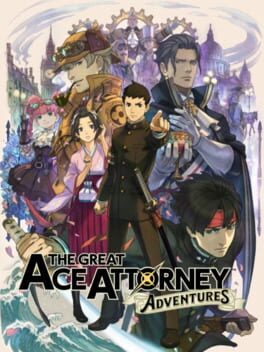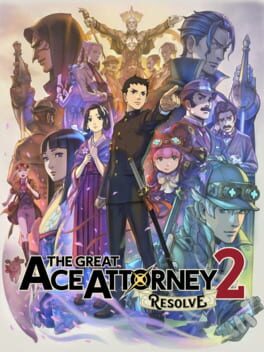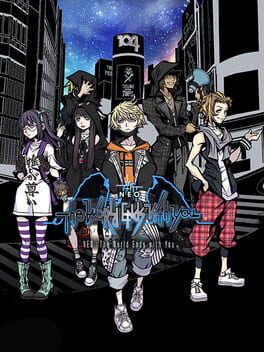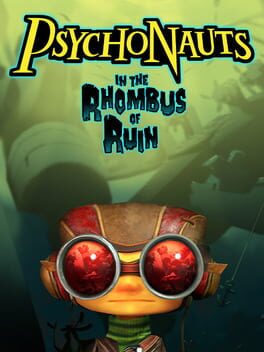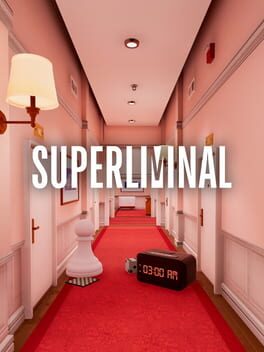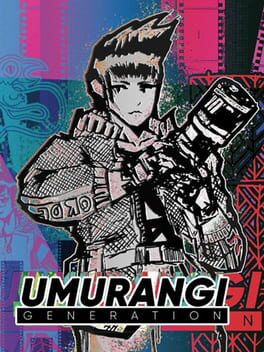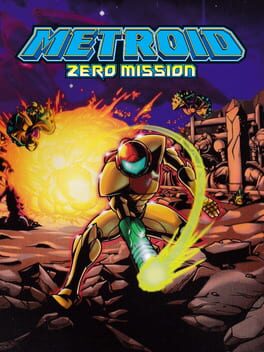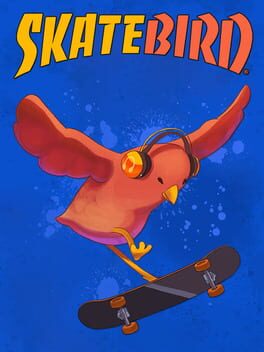Cakewalking
2017
On release it was seen as unnecessary and light on the new content, but I do think this is the game where floater fighters came together, and with a surprisingly compelling story to boot. It's full of personality, it's a blast to play and it's a cool sendoff to the story arc started back in UFO, just such a great fun if you're already attached to these characters and world. I definitely wish the netcode wasn't ass, but that's maybe too much to ask from doujin creators.
Went into Skyward Sword with pretty much negative expectations and found it enjoyable, all despite how much scuffed it is. There are plenty of glaring problems: like combat that's made a joke by button controls yet still frustrating when an input doesn't register one in a ten times; or padding of playtime with a lot of unnecessary fetching and some repetitive tasks.
My main gripe although is something I feel about many Nintendo games: Skyward Sword introduces a lot of potentially spectacular mechanics but doesn't build enough interesting challenges around. The game just rarely asks anything more than the ability to recognize patterns brought in the first time an item or mechanic is introduced. It's also irritatingly handholdy, to the point a solution to one of the most interesting spatial puzzles in the game gets awkwardly spelled out on a readable sign. I understand the game needs to be beatable by everybody, but then I wish the HD remaster introduced a new hint-removing difficulty mode, changing dialogues and signposts where it's possible to give new players an opportunity to figure out things for themselves. It's just such a missed opportunity, especially taking into account the few times when the game lets go of the reins really do feel great.
Still, there's totally more good than bad, and despite its annoyances Skyward Sword delivers neat surprises throught all its length. This makes it a pretty good time in my book, even though I wish it was more fulfilling.
My main gripe although is something I feel about many Nintendo games: Skyward Sword introduces a lot of potentially spectacular mechanics but doesn't build enough interesting challenges around. The game just rarely asks anything more than the ability to recognize patterns brought in the first time an item or mechanic is introduced. It's also irritatingly handholdy, to the point a solution to one of the most interesting spatial puzzles in the game gets awkwardly spelled out on a readable sign. I understand the game needs to be beatable by everybody, but then I wish the HD remaster introduced a new hint-removing difficulty mode, changing dialogues and signposts where it's possible to give new players an opportunity to figure out things for themselves. It's just such a missed opportunity, especially taking into account the few times when the game lets go of the reins really do feel great.
Still, there's totally more good than bad, and despite its annoyances Skyward Sword delivers neat surprises throught all its length. This makes it a pretty good time in my book, even though I wish it was more fulfilling.
I had originally finished GAA1 in 2019 with the Scarlet Study translation and felt good enough about the game to give it a 4, but playing the sequel with those two years of distance made me reexamine the feelings on that game a little to bring the score down a peg. Mind you it's still a fresh feeling Ace Attorney title and (S)herlock is the most joyous interpretations of the eccentric detective, but with the overarching mystery and emotional payoff hinging this hard on the resolution in the second game, GAA1 just didn't leave an impact on its own. I put a great trust on GAA2 to pull it through though.
It doesn't tie its plot threads as successfully as I hoped, and the last case doesn't manage to wow with yet another terrific layer of mystery to end the whole deal on an exclamation mark, but I'd be lying if I said that this game wasn't a joyous satisfying ride. It's beaming with personality and jovial moments, the cast of characters might be the best the series has seen, and being the second game writers were allowed to subvert them in exciting ways. The plot is good, and even more so than the first game it pulls off a story well-informed by the time period, thus being the Ace Attorney that's so refreshingly aware of the real life and the issues and challenges real people face. Best Takumi game since the Trials and Tribulations for sure, even if on the mystery side of things I'm not as over the moon as others seem to be.
Narratively, this one is classy: it's another take on the main theme of Psychonauts, that being the exploration of people as products of their past mental scars. You take a brief look inside the head of the most underutilized villain from the first game, and on the way there witness some neat character interactions, get exposed to more lore dumps and more jokes that generally land okay. It's a nice little bridge between the first and second game, I'm quite satisfied here.
Gameplay-wise this is nothing special: it's an early VR game where you interact with environments and solve puzzles. While Psychonauts psychic powers do fit VR quite nicely, the puzzles just aren't that good and can be usually reduced to exhaustion of things to interact with in the present room. RoR also lacks the physicality of VR games since you can only interact with things pointed directly at your sight, and, well this is probably the main appeal of the medium. Can confirm that you aren't missing out on a great experience if you just watch it on youtube.
It made even more excited for Psychonauts 2 though.
Gameplay-wise this is nothing special: it's an early VR game where you interact with environments and solve puzzles. While Psychonauts psychic powers do fit VR quite nicely, the puzzles just aren't that good and can be usually reduced to exhaustion of things to interact with in the present room. RoR also lacks the physicality of VR games since you can only interact with things pointed directly at your sight, and, well this is probably the main appeal of the medium. Can confirm that you aren't missing out on a great experience if you just watch it on youtube.
It made even more excited for Psychonauts 2 though.
2019
It started just like a projective geometry exam I had in uni, but then went on introducing new ideas at a galloping pace. You do have to think outside the box a lot which is the game's biggest success, but since each new idea gets immediatelly thrown away after minutes of runtime there's just not much to latch on to. It's impressive nonetheless.
2020
1994
I can forgive this game all the jank for having movement that gets so crazy cool with late-game upgrades, and, unlike Zero Mission, levels that actually utilize it. Also: exploration that's well signposted and logical, no random bomb spots and fake lava pits in passageways that hide progression critical paths. Super Metroid got drip and I see why it was so mindblowing in the 90s; it's still neat today.
2021
The vibes are first-rate and the idea of Tony Hawk with mid-air controls is quite good, but mechanically it barely improved since the kickstarter demo and even after messing with the game for a few hours it's been impossible to get a proper grip of controls. Just a bummer that no 15 seconds in Skatebird can pass without something feeling terribly scuffed.
2021
More than anything, MercurySteam proved that they can make a good, even great game, but so far their takes on Metroid lack the identity to become truly special. Gameplay is smooth as a Russian pancake and my playthrough was jam packed with unique moments. The jumps between world compartments work to serve the pacing of exploration, and no 5 minutes pass without a neat discovery, just a satisfying flow all-around.
It never gave me the desired sense of panic and dread though. EMMI ecounters invite the change in gameplay tempo, calling for quick reflexes and fast decision making, and don't get me wrong, it's a really damn cool change of pace. But being directly embedded in the exploration flux they cease to be the alien element outside of player control, and thus aren't really capable of creating tension the way SA-X did. The stylistic chops are definitely there! Just quite a bit lacking when compared to Fusion, which was able to create anxiety both in narrative and moment-to-moment.
Still, a damn good time. Really hope that the next step for Nintendo is to unfuck the work culture at MercurySteam so this major dub doesn't turn out to be a one-time fluke.
It never gave me the desired sense of panic and dread though. EMMI ecounters invite the change in gameplay tempo, calling for quick reflexes and fast decision making, and don't get me wrong, it's a really damn cool change of pace. But being directly embedded in the exploration flux they cease to be the alien element outside of player control, and thus aren't really capable of creating tension the way SA-X did. The stylistic chops are definitely there! Just quite a bit lacking when compared to Fusion, which was able to create anxiety both in narrative and moment-to-moment.
Still, a damn good time. Really hope that the next step for Nintendo is to unfuck the work culture at MercurySteam so this major dub doesn't turn out to be a one-time fluke.
